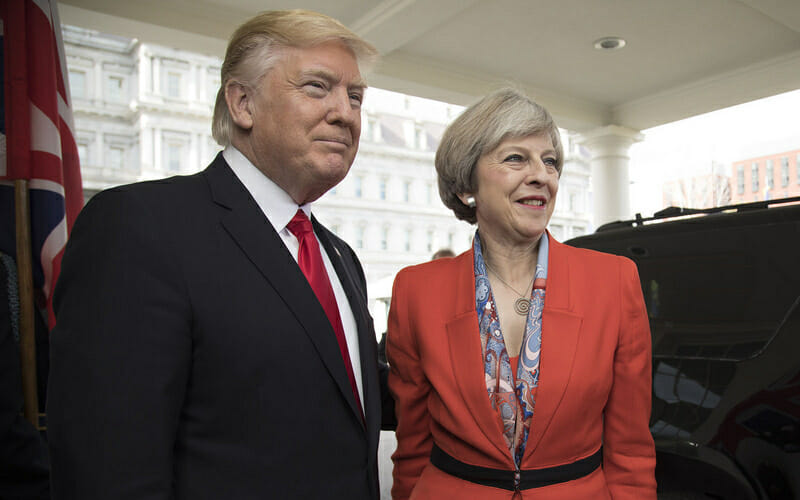
Human Rights, Protest, and “Hypocrisy”: On the Question of a Trump State Visit
The Donald Trump and Piers Morgan schmooze-fest that aired on ITV at the end of January reinvigorated a number of debates regarding Trump’s troubled relationship with the British public. Perhaps most pertinently, the question of the state visit – a possibility that is now back on the table following Downing Street’s confirmation that Trump will visit the UK in 2018.
Highlighting Trump’s familial connections to Scotland and the pride that his late mother might have felt towards his being granted a state visit, Morgan regurgitated the cry of hypocrisy towards those who would protest a state-sponsored, red-carpet welcome for the 45th President of the United States: “We’ve given state visits to Bashar al-Assad, to Robert Mugabe, to Vladimir Putin and to President Xi. So the implication from them trying to ban you, is that somehow you’re worse than they are.”
Of course, this overtly simplistic interpretation entirely undermines the role that the US has assigned itself over the past century – that is, as ‘leader of the free world.’ As the dominant political hegemon throughout the majority of the last century, the US has forcefully proclaimed the importance of human and democratic rights in spite of the extensive list of episodes – from Hiroshima to Abu Ghraib – that haunt the ‘liberal’ legacies of its leaders. Nonetheless, it is a Trump-led US that shirks the country’s traditional strategic commitment to democracy and human rights (albeit built on US exceptionalism) that most threatens the rules-based international order.
In his 2001 paper on the paradox of hegemony, Professor Bruce Cronin analyses the role of the US as the dominant power in the international community. He argues that whilst the hegemon has a disproportionate influence in shaping international rules and institutions, it is also the most able to flaunt them with impunity. So far, so good, for Trump’s ‘America First’ policy, and Morgan’s analysis and allegations of “hypocrisy.” But here’s the critical point – in doing so, Cronin outlines, the hegemon also has a disproportionate capacity to undermine such rules and institutions when it does contravene them.
This, precisely, is why the emergence of a US President who so brazenly subverts an international order based on cooperation and (aspiring to) collective values demands an unprecedented protest in response. Threatening to retreat from the international community that it shaped, US exceptionalism must be turned back upon itself: it must be pressured to advocate for the values that it has long claimed to espouse; failing to do so, it will set a very dangerous precedent.
None of this, of course, justifies red-carpet state visits for autocratic tyrants; such visits certainly warrant protest. Though it is unclear whether this is his point, Piers Morgan would be right to suggest that ‘red-carpet treatment’ for authoritarian despots are morally indefensible and ought to be strongly opposed. However, Assad, Mugabe, Putin and Xi have never claimed to be beacons of democracy and human rights. Nor do their actions have the same capacity to undermine international norms of human rights and democracy to the same extent as Trump’s – at least not yet.
Unprecedented protests regarding a Trump state visit recognise the unique threat that he, his discourse, and ‘America First’ pose: a deterioration into a world of narrow-minded nationalisms that is governed – even more so than today – by force.
In reality, it would be naïve not to recognise that we are already moving towards an increasingly multi-polar world order. The increasing regional dominance and global assertiveness of Russia and China are indicative of this. A United States that retreats from international treaties and demonstrates contempt for international law is already accelerating this process greatly. The international human rights implications of such developments are truly grave, and whilst Trump’s history of obscure praise for political strongmen from Duterte to Sisi can only worsen this trend, his recent State of the Union announcement that Guantanamo Bay is to be kept open – and will likely see its population grow – will surely aggravate an already frightening situation.
Whilst in the first instance Piers Morgan is incorrect to assert that previous state visits for tyrannical leaders have not been protested (they have), his ‘hypocrisy’ critique misses this point entirely. In spite of his misogynistic, Islamophobic, and homophobic rhetoric and policies, it would be disingenuous to suggest that Donald Trump is ‘worse’ than those despots mentioned by Morgan, in the sense of posing a direct threat to human rights. However, the structural threat that his presidency poses to international institutions, international human rights, and the liberal values that have been adopted (to some extent) by the international community, is much greater.
Considering the improbability of Theresa May applying the requisite pressure, and the failures of recent Prime Ministers to stand up to US Presidents on critical issues of international law, many citizens view protest as their last recourse. It remains as the only means of conveying much or the British public’s deep-seated opposition to Donald Trump, and the profound threat that he embodies.
In this sense, mobilisation has perhaps never been more urgent.

